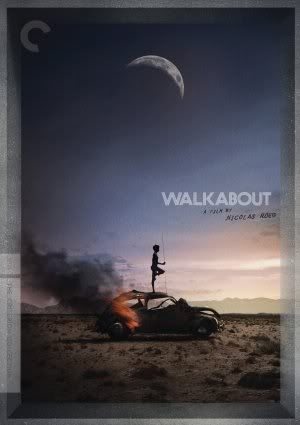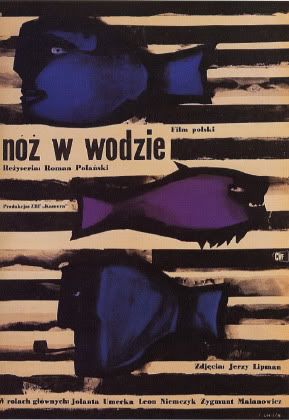This week somehow happened to a pretty good movie watching week with four legitimately great films, one Polish, one British set in Australia, one French in English, and one French and Austrian in French. The two not as great movies were (coincidentally?) both American and both big Academy Awards winners, though admittedly one of which, as you'll see below, was actually pretty good. Read all about it.
Online watching recommendation: I also watched this splendid 93-minute long documentary on the making of "The Social Network" that was included on the DVD release but is now available online. If you were a fan of the movie and/or are a fan of Fincher or Sorkin it's a great watch. Click the link for links to the four parts that are available to watch currently on IMDB.
A Beautiful Mind (Ron Howard, 2001): This an example of modern classical Hollywood filmmaking, in the sense that it's a modern take on the classical Hollywood filmmaking that was prevalent before the 1960's. It's a very familiar style, and one that does not need to be prevalent today because we know that after the Hollywood new wave of the 1970's that studios are willing to finance films that are a bit out of the ordinary, and this film was all ordinary. The film focuses on an interesting person, John Nash, but director Ron Howard and writer Akiva Goldsman don't do the story justice. I think a much more interesting movie could have been told with this material. The film deviates from many true events of Nash's life and I think his real life story would have made a much better film. I watched this film right now because I was studying game theory and Nash equilibrium in a class so I thought it would be a good time to watch it, and while I wasn't expecting to learn too much about those concepts I did expect them to be at least talked about a few times. The man was smart and a bit crazy, but the film focused on the crazy. I feel like they missed a great opportunity to infuse his life story with the concepts he came up with. The film has some well done scenes and Russell Crowe is very good, but overall the film felt much too familiar and disappointing.
Grade: C
Walkabout (Nicolas Roeg, 1971): This is a film that amazingly does so much with so little. But sometimes starting small and simple can lead you to great movies, and this is a great example of that. The film is basically about two siblings who get lost in the Australian outback and get help from an Aborigine, but the film takes on themes of communication, human brutality, sex, and the modern world vs. the natural world. It intercuts certain scenes with seemingly random images to create not only a sometimes brutal tone, but a subtle message. You can usually sense something is trying to be said in the movie but you don't always know what, but it's also not abstract to the point that it's unbearable. On top of all that, the cinematography and the composition of the images are amazing, and some of the best I've ever seen on film. So many different kinds of images are in this film, including wide landscape shots and intense close ups, and somehow they all mesh together well and create a consistent visual tone. Nicolas Roeg does an amazing job with his first solo directing effort evoking the iconic images of Stanley Kubrick and natural poetry of Terrence Malick (though probably not on purpose based on the year this came out). I imagine I'll be coming back to this film and liking it even more as times goes on. It's so ambiguous sometimes that watching more and more will only make the experience better. It's fascinating, beautiful, and brilliant.
Grade: A
Enter The Void (Gaspar Noe, 2010): This is a trip of a movie. The visuals are filled with neon, strobe effects, psychedelic visualizations and more. The camera work is amazing, including overheard shots that make it seem like the camera is flying over the sky. It's an absolute remarkable technical achievement, and it's rare nowadays that I go "how did they do that?" but thats exactly what I thought many times during the movie. The combination of live action and CG in this movie is seamless and so well done. But the thing that impressed me the most was not the visuals, but how well the story served the visuals. The film takes on death through drug culture. Much of the movie is after the main character has died and him looking over the world after he is dead, and it seems to imply that death is the ultimate trip, and I'm sure Noe would be okay with that "2001: A Space Odyssey" reference because the movie is obviously 2001 inspired and so is all of Noe's career (even including a 2001 poster in "Irreversible"). But what is so impressive is that he actually succeeding in creating a cinematic experience almost on par with 2001. The story takes on these huge themes in a way that is visually unique. The movie is definitely not for everyone, especially those with epilepsy and those who don't like seeing a lot of people having sex for long periods of time, but for those who are huge art and experimental film buffs this is a must watch, only because this type of movie is extremely rare. I personally found the movie to be extremely fascinating and an unforgettable experience that I wish I had seen in theaters. Gaspar Noe keeps getting better and never ceases to amaze. "I Stand Alone," "Irreversible," and now "Enter The Void" are all amazing works but his latest takes thing to a whole other level.
Grade: A-
The Piano Teacher (Michael Haneke, 2001): This is a provocative, yet deeply complex, character study about repressed lady who fulfills her sexual needs in some very weird ways. It takes on this sadomasochistic character in a way that you can empathize with her and not just think she's some weirdo, like some do in the film. Sometimes its hard to watch, but this the type of film that is meant to be hard to watch and is meant to shock you and not be easy viewing. Michael Haneke has proven that he does not make movies that are easy to watch ever, even in "Cache," it didn't have sex and not much violence, but it wasn't easy to watch because of the plot and highly unconventional nature of it. This film has a character that is hard to watch because she's a human being who is deeply flawed or mentally disturbed inside, yet on the outside she's a regular female. Isabelle Huppert gives a really impressive performance as the main character, always cold and calculated when it comes to her piano teaching, but also when it comes to sexual situations. This film is very interesting and it's very fun to try and figure out what's wrong with her and what she'll do next. Haneke has made a incredibly interesting and deep film that never gets out of control.
Grade: B+
Grade: B
Knife in the Water (Roman Polanski, 1962): This is a film that may not have a giant impact on you the second its over, but it grows in your mind and you start to realize how amazing the movie was. The film is basically an examination of the male ego set on a sailboat. What happens on the sailboat is basically a small version of what happens in society. Two men, one older and one younger, attempt to one-up each other because a beautiful women is present. This description can apply to a whole lot of movies including bland cliche teen movies, but what sets this apart is the way it's done. You may not even notice what's going on if you don't already know much about the movie until a fair while into the film. The contests are so subtle and consist of everyday things that sometimes you can't notice right away, but are actually much more realistic. The two guys wouldn't want the other guy or even the girl what they are doing, and to a degree they probably wouldn't want to acknowledge it themselves, so that is why the progress of the movie evolves so slowly. The film is extraordinary at how it takes simple things and creates huge meaning out of them. When I finished the movie I didn't think this highly of it, but now after examining it more and letting it soak into my mind I find myself wanting to go back and watching it again with this new knowledge.
Grade: A-







No comments:
Post a Comment